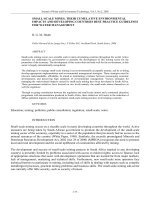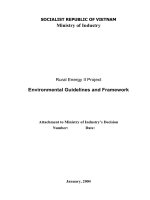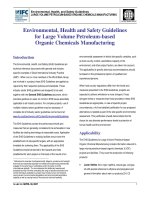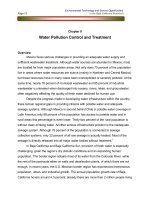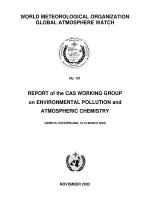Environmental Ethics and Economics: Values and Choices
Bạn đang xem bản rút gọn của tài liệu. Xem và tải ngay bản đầy đủ của tài liệu tại đây (6.71 MB, 53 trang )
Ch 2
Environmental Ethics and
Economics: Values and
Choices
Part 1: Foundations of
Environmental Science
PowerPoint® Slides prepared by
Jay Withgott and Heidi Marcum
Copyright © 2006 Pearson Education, Inc., publishing as Benjamin Cummings
Copyright © 2008 Pearson Education, Inc., publishing as Benjamin Cummings
This lecture will help you understand:
• Culture and worldviews
• Environmental ethics
• Classical and neoclassical
economics
• Economic growth,
economic health, and
sustainability
• Environmental and
ecological economics
Copyright © 2008 Pearson Education, Inc., publishing as Benjamin Cummings
Central Case: The Mirrar Clan Confronts the
Jabiluka Uranium Mine
• Uranium deposits in Australia often occur on sacred Aboriginal
land
- The Mirrar oppose the mine for cultural, religious, ethical,
health, and economic reasons
The mine will not be developed unless the Mirrar agree
Copyright © 2008 Pearson Education, Inc., publishing as Benjamin Cummings
Ethics and economics
• Both disciplines deal with
what we value
• Our values affect our
environmental decisions
and actions
Copyright © 2008 Pearson Education, Inc., publishing as Benjamin Cummings
Culture and worldview
• Our relationship with the environment depends on
assessments of costs and benefits
• Culture and worldview also affects this relationship
- Culture = knowledge, beliefs, values, and learned
ways of life shared by a group of people
- Worldview = a person’s or group’s beliefs about the
meaning, purpose, operation, and essence of the world
Culture and worldview affect our perception of the
environment and environmental problems
Copyright © 2008 Pearson Education, Inc., publishing as Benjamin Cummings
Worldviews differ among people
• Different worldviews
result in different
perceptions
• Aborigines saw the
negative environmental
impacts of the Jabiluka
mine
• Others saw jobs, income,
and energy from the mine
Copyright © 2008 Pearson Education, Inc., publishing as Benjamin Cummings
Many factors shape worldviews
• Religions
• Communities
• Political ideology
• Economics
• Individual interests
- Vested interest = an individual with strong
interests in the outcome of a decision that results
in gain or loss for that individual
Copyright © 2008 Pearson Education, Inc., publishing as Benjamin Cummings
Ethics
• Ethics = the study of good and bad, right and wrong
- Relativists = ethics varies with social context
- Universalists = right and wrong remains the same
across cultures and situations
• Ethical standards = criteria that help differentiate right
from wrong
- Classical standard = virtue
- The golden rule
- Utility = something right produces the most benefits
for the most people
Copyright © 2008 Pearson Education, Inc., publishing as Benjamin Cummings
Environmental ethics
• Environmental ethics = application of ethical standards
to relationships between human and non-human entities
- Hard to resolve; depends on the person’s ethical
standards
- Depends on the person’s domain of ethical concern
Should we conserve
resources for future
generations?
Is is OK to destroy a
forest to create jobs
for people?
Should humans drive
other species to
extinction?
Copyright © 2008 Pearson Education, Inc., publishing as Benjamin Cummings
Is it OK for some
communities to be exposed
to excess pollution?
We have expanded our ethical consideration
• To include animals, communities, nature
Copyright © 2008 Pearson Education, Inc., publishing as Benjamin Cummings
Expanding ethical concern
• Why have we expanded our ethical concerns?
- Economic prosperity: more leisure time, less anxieties
- Science: interconnection of all organisms
• Non-western cultures often have broader ethical domains
• Three perspectives in Western ethics
- Anthropocentrism = only humans have rights
- Biocentrism = certain living things also have value
- Ecocentrism = whole ecological systems have value
- Holistic perspective, stresses preserving
connections
Copyright © 2008 Pearson Education, Inc., publishing as Benjamin Cummings
Western ethical expansion
Copyright © 2008 Pearson Education, Inc., publishing as Benjamin Cummings
History of environmental ethics
•
People have questioned our relationship with the environment for
centuries
•
Christianity’s attitude towards the environment
•
•
Anthropocentric hostility, or
•
Stewardship?
The Industrial Revolution increased consumption and pollution
•
People no longer appreciated nature
•
Transcendentalism = nature is a manifestation of the divine
•
Ralph Waldo Emerson, Henry David Thoreau
Copyright © 2008 Pearson Education, Inc., publishing as Benjamin Cummings
The preservation ethic
• Unspoiled nature should be protected for its own inherent value
• John Muir (right, with President Roosevelt at Yosemite National
Park) had an ecocentric viewpoint
Copyright © 2008 Pearson Education, Inc., publishing as Benjamin Cummings
The conservation ethic
• Use natural resources wisely for the greatest good for the most
people
• Gifford Pinchot had an anthropocentric viewpoint
Copyright © 2008 Pearson Education, Inc., publishing as Benjamin Cummings
The land ethic
• Healthy ecological systems depend on protecting all parts
• Aldo Leopold believed the land ethic changes the role of people
from conquerors of the land to citizens of it
Copyright © 2008 Pearson Education, Inc., publishing as Benjamin Cummings
Deep ecology, ecofeminism, and justice
• Deep ecology = humans are inseparable from nature
• Since all living things have equal value, they should be
protected
• Ecofeminism = male-dominated societies have degraded
women and the environment through fear and hate
• Female worldview = cooperation
• Environmental justice = the fair and equitable treatment
of all people regarding environmental issues
• Wealthy nations dump hazardous waste in poorer
nations with uninformed residents
Copyright © 2008 Pearson Education, Inc., publishing as Benjamin Cummings
Environmental justice (EJ)
• The poor and minorities are exposed to more pollution,
hazards, and environmental degradation
75% of toxic waste landfills in the southeastern U.S. are in
communities with higher racial minorities
Copyright © 2008 Pearson Education, Inc., publishing as Benjamin Cummings
Environmental justice and Native Americans
From 1948 to the 1960s, Navajo miners were not warned
of radiation risks, nor provided protection by the industry
or the U.S. government
Copyright © 2008 Pearson Education, Inc., publishing as Benjamin Cummings
Economics
•
Friction occurs between people’s ethical and economic
impulses
•
Is there a trade-off between economics and the
environment?
•
Generally, environmental protection is good for the
economy
•
Economics studies how people use resources to provide
goods and services in the face of demand
•
Most environmental and economic problems are linked
•
Root “oikos” gave rise to both ecology and economics
Copyright © 2008 Pearson Education, Inc., publishing as Benjamin Cummings
Types of modern economies
• Economy = a social system that converts resources into
• Goods: manufactured materials that are bought, and
• Services: work done for others as a form of business
• Subsistence economy = people get their daily needs
directly from nature; they do not purchase or trade
• Capitalist market economy = buyers and sellers interact
to determine prices and production of goods and services
• Centrally planned economy = the government
determines how to allocate resources
• Mixed economy = governments intervene to some extent
Copyright © 2008 Pearson Education, Inc., publishing as Benjamin Cummings
Government intervenes in a market
economy
• Even in capitalist market economies, governments
intervene to:
• Eliminate unfair advantages
• Provide social services
• Provide safety nets
• Manage the commons
• Mitigate pollution
Copyright © 2008 Pearson Education, Inc., publishing as Benjamin Cummings
Conventional view of economics
• Conventional
economics focuses on
production and
consumption
• Ignores the
environment
• The environment is
an external “factor
of production”
Copyright © 2008 Pearson Education, Inc., publishing as Benjamin Cummings
Environmental view of economics
• Human economies
exist within, and
depend on, the
environment
• Without natural
resources, there
would be no
economies
Copyright © 2008 Pearson Education, Inc., publishing as Benjamin Cummings
Environmental systems support economies
• Ecosystem services = essential services support the life
that makes economic activities possible
*Soil formation
*Pollination
*Water purification
*Nutrient cycling
*Climate regulation
*Waste treatment
• Economic activities affect the environment
• Deplete natural resources
• Produce too much pollution
Copyright © 2008 Pearson Education, Inc., publishing as Benjamin Cummings
